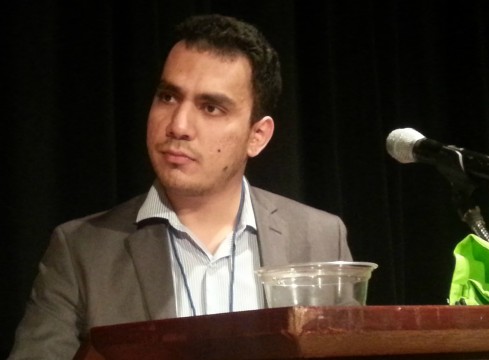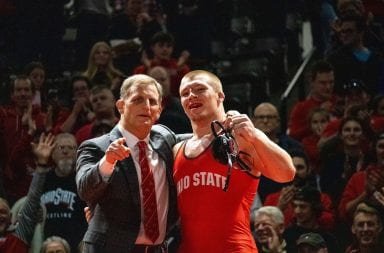Faisal Saeed Al Mutar lost his brother, his cousin and his best friend to al-Qaida militant forces.
As an Iraqi, he saw violence in his country. He saw religious leaders compete for positions in the government. He saw religious laws put into policy. And, during the buildup to the 2005 Iraqi election, he saw an opportunity to speak out against religious theocracy in his country.
Al Mutar became a secular activist.
“What’s it like being an atheist in the Middle East? It’s like being the only sober person in a car filled with drunk people and not being allowed to drive,” he said to a group at Ohio State. “So, I hope you join me in the fight. And may science and reason bless the United States of America.”
Al Mutar spoke at OSU on Saturday about unifying global secular activism during the annual Secular Student Alliance Conference, which aimed to join together groups of secular students and train student activists.
The Secular Student Alliance Conference, held last weekend at the Ohio Union, brought together about 240 visitors from across the country, a majority of whom were students representing allied student groups or campus chapters, for three days of speakers, discussion and workshops.
Al Mutar has now lived in the U.S. for two years, and he said he hopes young Americans will advocate and defend secularism from religious political influence in the U.S.
“It’s very important that young generations still feel this is something worth defending because many of the people who were born here, versus a person who grew up in Iraq, take things for granted,” he said. “Sometimes secularism is under threat from many political parties or political influences.”
The Secular Student Alliance, based in Columbus, is a national organization that works to organize the secular student community, while supporting secular values and activism.
August Brunsman, executive director of the SSA, said the main goal of the conference was to connect members of secular student groups to varying ideas and to each other.
Brunsman, a 2001 Ohio State graduate in psychology, said he views secularism in two ways: One being separation of religion from an institution — such as separation of church and government — and the other being more internally focused, with individuals basing their values and concerns on what can be observed in the here and now.
“That is our approach to the world, but it’s not necessarily the case that we’re trying to take anything away from anybody,” he said. “We’re trying to live our lives and be able to do that openly and proudly.”

About 240 students and activists from across the country spent their weekend at the Union during the annual Secular Student Alliance Annual Conference at the Union. Credit: Courtesy of Sarah Henry, SSA board of directors.
Visitors came from across the country to attend the event, some from the University of Florida and others from as far away as Utah. Some students camped out in dorm rooms during their weekend.
Addison Snyder, an SSA chapter member and third-year in computer science, was at the event with a small group from Bowling Green State University. He said the conference served as an inclusive environment for individuals to share views outside of a religious organization.
“Sometimes you get people who have very, very specific views and it’s very hard for them to connect with the rest of the world without offending or hurting them,” he said. “It’s just great to have a verified safe zone with people who have similar mindsets. It’s a relief.”
The conference afforded students an opportunity to discuss speech topics ranging from abstinence-only sex education and LGBT activism to secular politics and student rights.
Magdalene Bedi, a second-year at American University, spoke about her experience defending student rights in Mississippi, in relation to her high school’s violation of the Establishment Clause of the U.S. Constitution.
A civil action suit was filed by the American Humanist Association on Bedi’s behalf against the Rankin County School District when she was 17 years old, after being forced to attend religious assemblies at Northwest Rankin High School in 2013. Bedi attended an assembly in which students were given a sermon about gender identity and overcoming obstacles through Christianity, she said.
Like her brother two years ahead of her in school, she said she hated the repeating “religious entanglement” within the school district, but was unaware she could do anything about it until she talked to a friend. She blamed the educational system for failing to instill in students a sense of empowerment regarding their rights, particularly students in high school.
“I think the more we empower students and the more we spread information about the Constitution, the less likely things like this can happen,” Bedi said.
Bedi added that her parents were supportive and encouraged conversation about topics of faith exploration while she was growing up, and she now hopes to extend that atmosphere through her advocacy.
“It’s so important to me that I talk to young people and young people see that it is possible to challenge these oppressive institutions and it’s possible to make changes, even at this age,” she said.
Brunsman, who first got involved with SSA in 2000, said he sees the secular movement growing among young adults, adding that “millennials are far and away the most secular generation that the United States has ever had.”
A Gallup poll published in 2014 stated 30 percent of Americans in the 2010s said they felt the view that religion can answer most problems today is “old fashioned and out of date,” a nine percent rise over the last two decades. Less than half of 18 to 29 year olds surveyed said religion “can answer problems.”
Brian Groenke, a second-year in computer science and vice-president of the SSA chapter at OSU, said he feels there is growing support for secularism among young adults as well.
“I think people are starting to understand more and more of these secular values,” he said. “And I think that’s even supported by people who may have belief in a higher power, and that’s fine, and we want to welcome those people if they can share our values.”
Groenke said he hopes the exposure on campus from hosting the convention at OSU will help the student organization, and increase the understanding of secular values and combat the stereotype of the “angry atheist.”
The conference also featured tables from allied groups, like the organization Secular Women and the Miami Valley Skeptics radio show, as well as a documentary screening and a stand-up act by comedian Ian Harris.
Two awards were also given, with Marsha Botzer, of the National LGBTQ Task Force, receiving the Backbone Award, and writer Greta Christina receiving the Ambassador Award for their respective work in relation to secular values.









